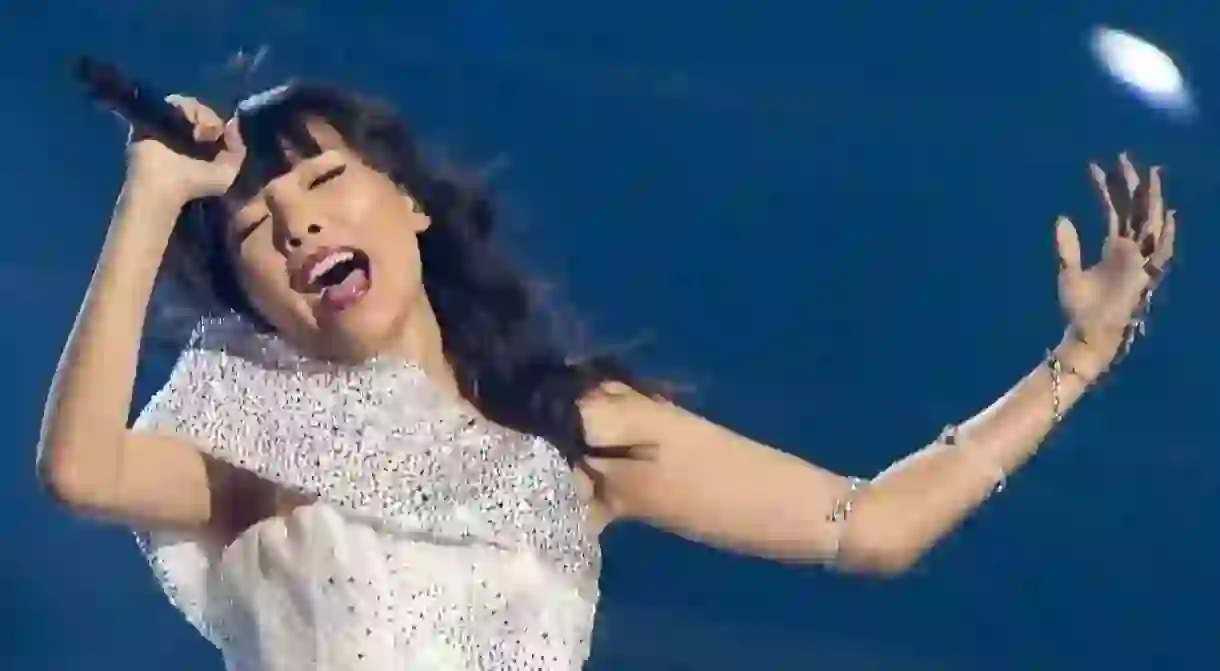Why Australians Love Eurovision So Much

The Antipodean love of Europe’s chintziest music event, Eurovision, is a strange love affair. Despite a hemisphere of distance between Australia and the extravaganza, the Land Down Under has forged a strong bond with the unique pop spectacular, so much so that it has begun to compete. So what is this thing between the Commonwealth outpost and Europe’s most ridiculous date on the calendar all about?
Australia loves Eurovision. It always has. For decades, families have sat in front of television sets and friends have met at bars and pubs appropriately themed for the occasion. And a Eurovision wouldn’t go by without there being scores of house parties held up and down the country in its honour. Eurovision has made its mark on Australian pop culture and has provided satirical fodder for its comedians, in particular, Santo Cilauro’s 2003 Molvania entry, Zladko ‘Zlad’ Vladcik.
A lot of the competition’s appeal comes down to the Australian sense of humour. As a nation that doesn’t take itself too seriously, Australians are charmed by Eurovision’s cultural cringe and ridiculousness. They also find comedy gold in self-deprecation and poking fun at things, so they also take great pleasure in affectionately ‘taking the piss’ out of each country’s entry.
Many people still remember Terry Wogan’s dry, acerbic commentary undercutting the delightful nonsense that was televised into Australians’ living rooms. However, when he stepped down in 2008, some of the most loved homegrown media personalities picked up the reins and injected the commentary with Australian wit, pulling the local audience closer into the contest’s orbit, despite the obvious difference in continents.
https://www.youtube.com/watch?v=_Ll-_cPNRAk
Obviously, Australia is not a part of Europe. However, there is a shared history between the two continents, which also plays into the nation’s penchant for the event. Nearly half of all Australians are first or second generation – apart from the country’s indigenous people, it is a country of migrants. Although Australians have roots all across the globe, many maintain ties in Europe due to British colonisation and the subsequent waves of European migration that have helped define contemporary Australian society. Eurovision offers an opportunity for Australians to enjoy their different cultural heritages without being too earnest about it, which is a typically Australian thing to do, though admittedly now that Australia is competing, they are starting to take Eurovision a little more seriously.
Jessica Mauboy‘s performance in the 2014 Copenhagen Eurovision competition finally acknowledged the sunburnt country’s adoration of the contest. Not singing to compete, the Northern Territorian was invited on stage to join the furore as a ‘guest performer’ in an unprecedented gesture of mateship that hasn’t been extended to any other country since (although Morocco did win seven points and came in second to last place in 1980). In a sequined display of camp Australiana, Mauboy’s interval performance dazzled the crowd and showed the world that the Land Down Under can bring it to the competition.
Having already secured her spot in the finals, Mauboy returns to Eurovision 2018, hosted by Portugal. Her appearance bookends five consecutive years of Aussie participation. Guy Sebastian followed Mauboy in 2015, coming in at fourth place. In 2016, Australia nearly took the Eurovision crown with Dami Im’s ‘The Sound of Silence’, although she was knocked out of first place by Ukraine, and Isaiah Firebrace earned ninth place with ‘Don’t Come Easy’ in 2017.
If Mauboy – or any future contestant – wins, Australia must forgo hosting duties, as outlined by the European Broadcasting Union (EBU). But for this former colony, winning was never really the aim of the game.













